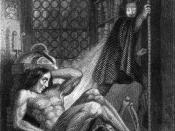Theme of the divided self within Emily Bronte's Wuthering Heights and Mary Shelley's Frankenstein.
Thematically, the divided self is one of the most interesting themes within both novels and is of great importance to the development or ruin of the characters in both 'Wuthering Heights' and 'Frankenstein.' Both authors when primarily exploring this theme focus upon the physical, mental or spiritual division within certain characters.
In Emily Bronte's novel 'Wuthering Heights,' the principal characters Cathy and Heathcliff are presented as needing this division within themselves to recognise their need for each other. This endurance of physical, mental and spiritual division whilst alive, allows them only tragically to experience when in death, complete entity within themselves.
Primarily Cathy is not depicted as divided; instead, she is presented as belonging to a family unit, which seems to stay intact until the arrival of a 'gypsy brat.' Although Heathcliff creates a divide within the family due to his arrival, Cathy is seen to gain a friend with whom she feels she has an affinity both physically, spiritually and mentally, which will become increasingly evident as the novel progresses.
However, this alliance throughout the novel is frequently thrown into turmoil by outside influences or factors. As we are informed from the onset, the "greatest punishment" that could be bestowed upon Cathy was separation from Heathcliff.
Cathy and Heathcliff's separation only therefore ensues as a result of their initial outing to Thrushcross Grange. Their promise to grow up together as 'rude as savages,' is destroyed when Cathy and Heathcliff are separated physically by many factors resulting from this visitation. Just as the Linton's dog 'holds' Cathy, so too is the Linton's house symbolically presented as separating her from Heathcliff, when Heathcliff resorts to peering in through their 'great glass panes' to see Cathy,


